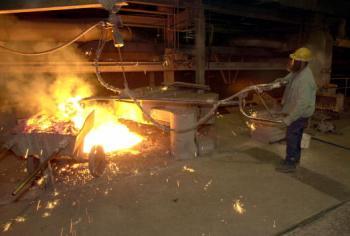The economics editor of The Age, Tim Colebatch, has called for a public debate about the very future of the Australian people in his article “Digging a hole for ourselves.”
That headline captures the quarry mentality of lobbyists who fail to see a major role for our people, industries and country beyond the energy and mineral resources produced in the west and north of Australia.
In disagreeing with the quarry lobby for trying to put all our eggs in one basket, Tim Colebatch has taken issue with the Reserve Bank chiefs and the Federal Treasury Deputy Secretary David Gruen: “With the greatest respect, I sharply disagree. I think we need a national debate on whether it really is in our interests to try to sell off our mineral wealth as rapidly as possible, as our economic leaders believe.”
As a non-renewable resource, the minerals in the ground, such as iron ore and coal, represent capital owned by the taxpayers, where mining companies are given a licence to mine at the behest of the Australian public.
So these finite endowment assets should be treated with great care for the benefit of present and future generations of Australians in the way our forebears looked after them.
While officials at the Reserve and Treasury have knowledge and experience in central banking and bookkeeping, an industry policy should come from the advice and knowledge of engineers, builders, farmers, inventors, tradespeople, historians, professionals, bodies representing working people and many others.
It’s a Question of Values
And it’s the challenge of nation-building, of our people working in diverse projects and industries, big and small, across the length and breadth of the continent.
People want security of employment, a decent pension when they retire and security for their country.
It will come in rebuilding the manufacturing industry and agriculture as it was done for 200 years.
These two survival industries will provide all manner of widgets and clean food on the tables for the consumption of the Australian people. Surplus production can go to export.
The unique advantage in restoring manufacturing and agriculture is to provide a replacement for unnecessary imports responsible for a 30-year growth in Australia’s foreign debt of $638 billion and is the only means of reversing the trend.
This rising foreign debt has been described as unsustainable by the leaders of the major banks, Professor Garnaut and the International Monetary Fund.
Former Prime Minister Kevin Rudd and Minister Bill Shorten were vocal supporters of manufacturing for Australia before their election to government–and why?
Because manufacturing especially, plus agriculture, will create hundreds of thousands of good jobs, boost incomes, increase company profits, reduce welfare bills and swell the treasuries of state and Federal governments.
At a stroke, the people and nation become self-sufficient again in the provision of all the necessities of life and gain freedom from an unhealthy dependence on foreign imports and foreign powers.
From China to Europe to America, people have prospered when they have protected their basic industries with various measures in the form of subsidies, duties, tariffs, quotas and the like.
What Happened to Manufacturing?
Before that can happen again in Australia, however, people will want to know why the prosperity and security enjoyed by their forefathers for 200 years was taken from them a generation ago.
Industry policy consultant Martin Feil writes in The Age that only the elite have since shared in the prosperity. “There has been absolute bipartisan support for the past 20 years of a policy that simply strips out the minerals, oil and gas that are the sovereign wealth of all of us without attempting to use Australian labour to add value to the exports.”
It was a new Japanese word kudoka that would describe the phenomenon for Australian workers, who were to see their manufacturing jobs disappear–in English, kudoka means “hollowing out”.
Living standards would tumble as a family, once supported by one income, would need the incomes of two people to survive.
From the 1980s, elite opinion-makers abroad were favouring the global perspective of financiers and financial markets that began to eclipse manufacturing and the industrialists in the advanced countries, including Australia.
Multinational corporations demanded and won the removal of tariff protection from industries from those countries whose jobs and industries they have since been shipping to low-wage and poor countries under a mantra of “globalisation”.
Trade Now Dead
At the citadel of finance capital, the biggest merchant bank, Goldman Sachs, could point to its former leaders Robert Rubin and Henry Paulson as secretaries of the US Treasury, before the bank itself and others in America collapsed in the 2008 financial meltdown, pulling their countries down into a pit of debt.
Britain’s long decline began in the 1920s as the City of London’s bankers displaced the industrialists in the country’s policy making.
Today, British banks have been nationalised after their recent collapse, but they are unlikely to be rescued a second time by Britain’s taxpayers.
So it’s clear that the excesses of the unregulated bankers’ regime has brought the free markets crashing down, silencing the multinationals song of “globalisation” and free trade as simply a ploy for no protection of a nation’s industries, its people and their country.
Now, China is raising trade barriers to freeze out competition from foreign multinationals.
“Trade is now dead in America,” the Democrat chairman of the US House of Representatives financial services committee, Barney Frank, told a meeting on the margin of the World Economics Forum in Davos, Switzerland, earlier this year. “You could not get a trade bill through Congress” he said.
Protecting Australia’s Interests
Likewise for Australia, protection is essential for manufacturing and agriculture.
The security of clean and healthy food for our people will require the restoration of our quarantine system trashed by the Howard Government when it took Australia into a free trade agreement with the US five years ago. The bill on our merchandise with the US has increased to $14.8 billion a year!
The trashing of our quarantine policy was on display for a year during the equine influenza outbreak in 2008.
For a hundred years before that, our quarantine policy had prevented the import and spread of exotic diseases found in plants and animals in the other four continents, and for good reason.
Some time back, the Tonight TV program commissioned a scientific study of food imports offered for sale in Australia.
The laboratory tests showed that a range of vegetables failed to meet Australian food safety standards and that more than half of the foreign food imports tested were unfit for human consumption.
So a welcome and necessary upgrade of our quarantine policy will lift the quality of food consumed at home and bring a premium in prices others will pay for the export of clean and green Australian farm produce.
After household use, farmers will require adequate water for horticulture and their herds from irrigation systems run by the states, not from faraway Canberra.
Nation-building offers an abundance of good full-time jobs in place of the part-time and casual jobs imposed on the workforce by the Business Council and the foreign multinationals for the past 20 years.
Super Funds
Of course, an industry program for the nation will need a regular stream of money.
In recent days, the Government has pointed to the national savings in the $1.2 trillion superannuation sector, estimated to grow to $5 trillion by 2025.
“We need to ensure that great asset is used to maximum advantage of the Australian economy,”
Minister for Financial Services, Superannuation and Corporate Law Chris Bowen told a superannuation conference in Brisbane. “This might mean greater investment in infrastructure assets…”
The minister was supported by Peter van Onselen, contributing editor for The Australian. “Superannuation savings could replace Chinese investment in the resources sector,” and looking long term: “Short-term thinking is not only to the detriment of those investing in superannuation, but hurts the national interest if it means investment in the resources sector are left to overseas enterprises.”
The size of the super funds may soon pass Australia’s gross domestic product, so they need a safe and secure place to park their capital, with a guaranteed return for their members, preferably unencumbered by fees and charges levied by fund managers.
For 10 years, Will Bailey, former managing director of ANZ Banking, has been calling for a Federal Government-backed development bank, explaining on ABC radio: “To some people, banking services are as important as medical services … and the Government makes no apology for what you’d call basic medical provisions through Medicare.”
With credit rationing for industry tipped by the major banks, the Commonwealth could fill the gap with the issue of credit as it once did.
Last year, BHP Billiton chairman Don Argus proposed that the Government should open a bond market for Australian investment in our “endowment assets”, citing the nation’s savings in the superannuation funds aforementioned by Minister Bowen.
The Government could establish a development bank with the issue of bonds as a back-up to the financial system.
The bank could provide finance for the Government’s infrastructure, assist in rolling over foreign debt, offer loans to businesses, farmers and home owners when the private banks won’t, and take stakes in strategic industries to counter foreign incursions and more.
The investment of super funds in the development bank would drive a surge in business activities across the country, offer enhanced employment opportunities to fund members and provide a no-risk return on their money guaranteed by the taxpayer.
Some years ago, a leading columnist on free markets, David Clark, wrote in The Australian Financial Review that we are forever talking about things economic, but seldom speaking about things that are social, when people need both dimensions for balance.
Frank Lee is a former editor of The Clerk, the national journal of the Federated Clerks Union of Australia, and a former secretary of the Victorian branch of the ABC Staff Association.


